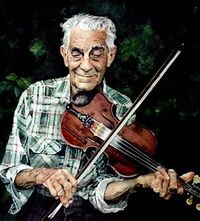Annotation:Moon Behind the Hill: Difference between revisions
No edit summary |
No edit summary |
||
| Line 23: | Line 23: | ||
''the Hill,' and I said, 'Would you play it again?' He said, 'Yea,' so he played it again. He said, 'Do you play a fiddle?' I'' | ''the Hill,' and I said, 'Would you play it again?' He said, 'Yea,' so he played it again. He said, 'Do you play a fiddle?' I'' | ||
''said, 'Yea.' So I come home, and two or three months later , I thought of it and just went to play it. That's the way tunes is.'' | ''said, 'Yea.' So I come home, and two or three months later , I thought of it and just went to play it. That's the way tunes is.'' | ||
''If you like them, they'll just come around.'' <ref>Erynn Marshall, '''Music in the Air''', </ref> | ''If you like them, they'll just come around.'' <ref>Erynn Marshall, '''Music in the Air Somewhere''', West Virginia Univ. Press, 2006. </ref> | ||
</blockquote> | </blockquote> | ||
|f_source_for_notated_version=Jim Childress with Uncle Henry's Favorites (Albermarle County, Va.) [Phillips]. | |f_source_for_notated_version=Jim Childress with Uncle Henry's Favorites (Albermarle County, Va.) [Phillips]. | ||
Revision as of 01:57, 21 May 2020
X:1 T:Moon behind the Hill N:from the playing of fiddler Melvin Wine (1909-2003, Braxton N:County, central West Virginia) M:C| L:1/8 R:Two-Step Q:"Moderate" N:Play with a swing, a bounce D:Augusta Heritage AHDVD 04, Melvin Wine - "One More Time" (2003) D:https://soundarchives.berea.edu/items/show/7675 D:https://www.slippery-hill.com/recording/moon-behind-hill Z:Transcribed by Andrew Kuntz K:G B-c|d2B2[B,2G2][B,2G2]|+slide+[D3D3][DD] [DD]EDC| B,2D2[G,2G2][D2B2]|{c}d3d d2 (AB/c/| d)BAG F2[D2A2]|{D}[F3A3][FA] [FA]E[FA]E|D2D2 {F}E-D3|[B,6D6]([DB]c| [D2d2])[D2B2][G,2G2][G,2G2]| +slide+[D3D3][DD] [DD]EDC| [B,2D2]DD[G,2G2][DB]B|{c}d3d- d4| [c3e3]c c2ef|gfga geBc| d2d2 [Dc]-[DB]-[D2A2]|[G6B6]|| [D2A2]|b4 +slide+b4|b6 ba|b2 ba g-f e2|d3c- (d[d3f3])| +slide+a4 a4|a6fg|a2a2 {f}g-f e2|d6A2| b3 _b-=b4|+slide+b6 ba|b2 ba g-f e2|[d3f3]c- dc[d2e2]-| [e3e3][de]-[e2e2]f2|g4B3d| e2d2 [Dc][DB] [D2A2]|[G,6G6]||
MOON BEHIND THE HILL. AKA - "Moon Behind the Mountain." American, Air (cut time). G Major. Standard tuning (fiddle). AABB. The piece was popularized by West Virginia fiddler Melvin Wine (1909-2003), who played it at a moderately brisk walking pace, although it since has been recorded at faster speeds. It is an adaption of a song air, and although there is an Irish song called "Moon behind the Hill" (sung to the air "Harp that Once from Tara's Halls", for one), it is unlikely that this is the source for the song. A more plausible candidate for a precursor is "Moon behind the Hill", a popular parlor song by T. Brigham Bishop, published in Boston in 1858. The words begin:
I watch'd last night the rising moon,
Upon a foreign strand;
Till mem'ries came like flow'rs of June,
Of home and father-land;
I freamt I was a child once more,
Beside the rippling rill,
When first I saw in days of yore,
The moon behind the hill.
When first I saw in days of yore,
The moon behind the hill.

Sometimes I'd be out somewhere and I would pick up one like...oh, what is the name of it anyhow? Well I play it a lot, but I learned it. I was a-walkin' from Fairmont to Clarksburg along the road. That's a thirty-mile walk. Well we got about halfway when a feller that was with us said, 'Let's go up to this dancehall and rest 'while and watch 'em dance.' 'Moon Behind the Hill,' that's the tune! So we went up to that dancehall, and there was nobody there but that fiddler, the guitar player, and the bouncer. They was playin' this tune and I'd never heard it, so I said to this feller, 'What is the name of that?' and he says, 'Moon Behind the Hill,' and I said, 'Would you play it again?' He said, 'Yea,' so he played it again. He said, 'Do you play a fiddle?' I said, 'Yea.' So I come home, and two or three months later , I thought of it and just went to play it. That's the way tunes is. If you like them, they'll just come around. [1]
- ↑ Erynn Marshall, Music in the Air Somewhere, West Virginia Univ. Press, 2006.

